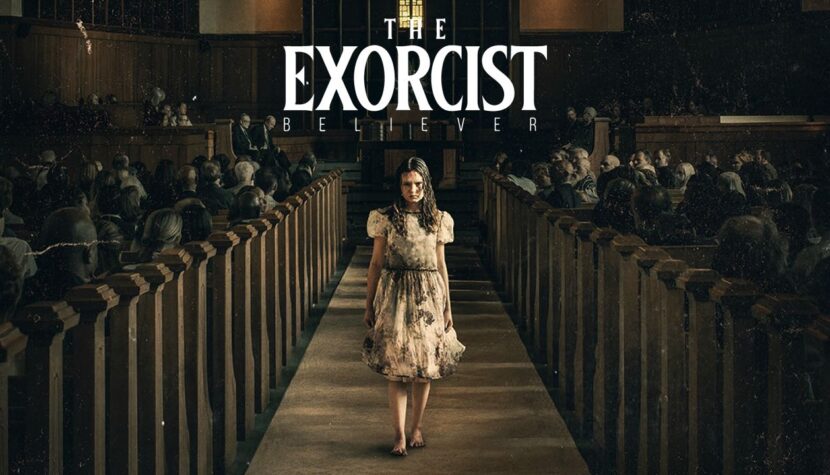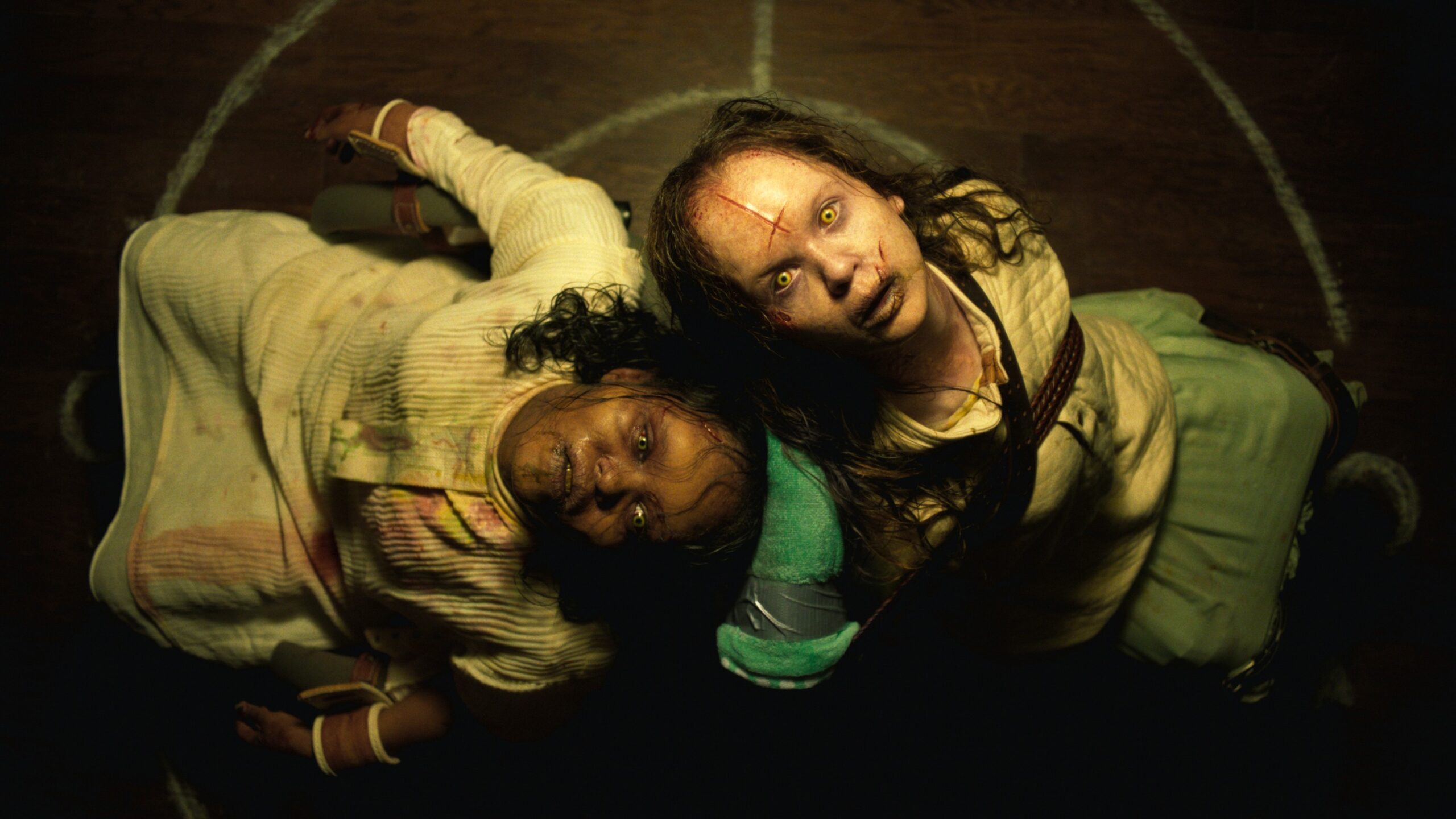THE EXORCIST: BELIEVER. Faithless and cheap

If this successful requel to that iconic work had been made at the beginning of the last decade, it might have kicked off a retro aesthetic trend, full of references to dark 70s satanic horror. However, nowadays such a project has to step onto the dance floor where the rules are dictated by other creators, and simply joining the dance won’t make you a pioneer or guarantee success. This is mainly because contemporary old-school horror films about ghosts and possessions are doing exceptionally well, largely thanks to The Conjuring universe. The series has shaped the tastes of audiences, setting standards for the years to come. James Wan, the creator of the series, cleverly drew inspiration from 70s classics, extracting key atmospheric elements and a few direct references. Naturally, he blended this with a modern formula, adding his own distinctive techniques. Wan is a multitasker who transitioned from paying homage to genre masters to engaging the audience on his terms, unafraid to push the style further.
The Exorcist: Believer emerged in a landscape where, in the wrong creative hands, it could have come across as unnecessary, and worse yet, a painful step backward for the entire subgenre. Unfortunately, that’s exactly what happened. It’s a film that audiences seeking entertainment and scares will quickly dismiss, given that there are better alternatives in the realm of supernatural horror. What makes the new Exorcist doomed to live in the shadow of James Wan’s imperfect yet captivating universe?

David Gordon Green recently completed the Halloween trilogy. The first installment of the revived series was well-received by both audiences and critics, but the subsequent films left much to be desired. With The Exorcist: Believer, the director once again, more noticeably than before, seems uncertain about whether to faithfully recreate the magic of the original or to deconstruct it for the purpose of experimenting with its themes. As a result, the film becomes a clash of conflicting forces, mutually canceling out their potential. Surprisingly, there are many elements here reminiscent of the Michael Myers trilogy, as if Green couldn’t steer away from that course. Without his co-writer Danny McBride, he appears to be wandering in the fog, with his only recourse being to pursue random ideas and develop them on complete autopilot. For the director, this is a simple way to quickly and painlessly finish working on the project, while for the audience, it results in an experience of disjointed gibberish and lost motifs. The very essence of the story had to be added in the final monologue, as an artificially applied intellectual pillar that was missing earlier to prevent everything from collapsing like a house of cards.

In his previous horror films, Green has shown an ambition to convey his own perspective on the world and incorporate complex socio-philosophical themes through genre conventions. He doesn’t merely aim to provide short-lived entertainment to the audience but to leave them with some reflections or confront them with certain ideas. It cannot be denied that the director’s films exhibit a distorted perspective and ideological chaos – one that makes us beg for the creator to return to the superficial comedies like Pineapple Express. In terms of worldview, The Exorcist: Believer is clearly a mishmash of various remnants from the Halloween trilogy, which have spent a bit too long in the fridge. The technical execution quality is not as perceptible here as it was in the sequels, Halloween Kills and Halloween Ends. However, in the case of this prequel to William Friedkin’s film, the quality of technical execution is not that noticeable either. Again, this is the result of the director’s inconsistency.

In the first half of the film and in a few other scenes, a fairly faithful reproduction of the cold and matter-of-fact style of the original The Exorcist is achieved. Occasionally, there are some unconventional editing choices or more interesting shots. However, these attractive flourishes don’t matter much when these stylistic jumps fail to form a coherent directorial concept for the narrative. As a result, the audience quickly forgets about these better-arranged moments, and they are cyclically frustrated by the lack of visual character. This is nothing more than the remnants of the Halloween trilogy and even lesser works of better directors like John Carpenter or the previously mentioned James Wan.

David Gordon Green must have found great amusement in reversing and transforming established patterns. However, such a plot construction should be a means to an end, not an intention in itself that satisfies only the author. In a film with such a somber tone as The Exorcist: Believer, it’s as out of place as a square peg in a round hole. A talented director could have made an engaging showcase of imagination out of such disharmony. In this case, however, it seems to amount to nothing and becomes an empty-sounding element of a puzzle that we have no desire to solve. The twists proposed by the screenwriters might look good on paper, but in practice, they elicit nothing more than a sigh. Overturning the viewer’s expectations upside down has no power when it lacks logical sense – then it unintentionally takes the form of truly cringe-worthy scenes. The characters are used by the director as mere pawns, allowing only for revisionist antagonism against archetypal tropes. There is a lack of focus, concentration in examining their fates, and credibility. Not even great actors can help when they are forced to deliver absurd, endlessly drawn-out dialogues that awkwardly revolve around lofty theses. In this presented world, contrary to the title, you simply cannot believe.

Out of all these inflated ambitions, clashing tendencies, which do not fit together at all, perhaps the biggest flaw of The Exorcist: Believer arises. This film simply does not maintain tension. The screenwriters had only a few constant constituent elements to construct this story. In arranging them, they got lost in an extremely glaring way. The plotline is constructed disjointedly and fragmentarily, without the tight tension that envelopes the atmosphere of hopelessness and constant fear as seen in the original. The ending is no longer able to stimulate the viewer in any way; it lacks the claustrophobia and horror of the iconic scenes from the 1973 film. Quentin Tarantino admitted in an interview that he wouldn’t be able to make such a subdued, dense film as Friedkin’s The Exorcist. Green simply lacked that humility.

The Exorcist: Believer attempts to deceive the audience into believing it offers some fresh ideas, but it’s a complete hoax. The execution of a competent, solid film turned out to be secondary here. The main ambition was to launch a new trilogy (already announced for April 2025 is The Exorcist: Deceiver) and blandly showcase Blumhouse’s ownership of the brand. This is undoubtedly the worst and least entertaining horror film directed by David Gordon Green. It’s still better to watch the beginning of The Conjuring 3: The Devil Made Me Do It, where the production team briefly understood the atmosphere of Friedkin’s style most effectively, or even better, revisit the two previous iconic horror films by James Wan.

